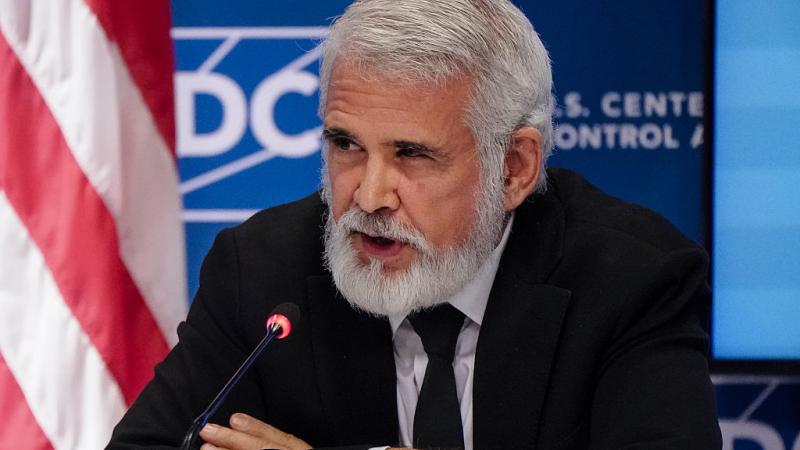Coverup? Senate panel concludes health officials downplayed COVID vax risks despite early warnings
Federal health officials received reports about potential cardiac inflammation effects just months after the mRNA vaccines were approved, but delayed notifying the public about them and ultimately downplayed the risks, a senate subcommittee concluded.
A Senate subcommittee's interim report has disclosed that federal health officials from the Centers for Disease Control and Prevention (CDC) and the Food and Drug Administration (FDA) received warnings as early as February 2021 about the potential for patients to develop myocarditis in the wake of the COVID-19 mRNA vaccination. It also concludes that they delayed issuing a public warning about the deadly heart disease, and downplayed the risks of the vaccine and the condition, new records show.
The memos are part of the more than 2,400 pages of documents released by the chairman of the Permanent Subcommittee on Investigations, Ron Johnson, R-Wis., as well as the subcommittee’s non-final report, “Failure to Warn: How Federal Health Agencies Downplayed the Risk of Myocarditis and Other Adverse Events Following COVID-19 Vaccination.” Johnson released the report on Wednesday ahead of a hearing about the panel’s findings.
Johnson’s investigative panel concluded that federal health officials knew about the risks of myocarditis and other associated inflammation conditions related to the mRNA vaccines, but delayed alerting the public for months about the emerging evidence, and downplayed those health concerns associated with the vaccines.
“Now, after facing four years of the Biden administration's efforts to undermine the public's access to information and my oversight work, I immediately issued a subpoena to HHS when I became chairman of this committee,” Johnson said at the hearing on Wednesday. Johnson sent more than 70 oversight letters to the Biden administration, but most were ignored, the subcommittee said.
“The subpoena records I'm releasing today, which are discussed in the interim report, do not contain FOIA redactions and will finally provide the public a more complete understanding of the Biden administration's awareness of the risks of myocarditis following COVID-19 injection,” Johnson continued.
Most patients who suffer the symptoms associated with myocarditis survive. However, the severity of the affliction can vary from case to case, according to the Centers for Disease Control and Prevention.
Early warnings given
By late February 2021, just about two months since the rapidly developed Pfizer and Moderna mRNA vaccines were approved for use, the memos show that CDC officials received one of the earliest warnings about cases of heart inflammation conditions potentially linked with the administration of the shots.
The Centers for Disease Control and Prevention did not address or acknowledge the risks until late May, about three months later.
In late February, Israeli Ministry of Health officials requested a point of contact with the CDC and FDA to discuss reports of myocarditis, especially in young people, after the administration of the vaccine. At the time, Israel had implemented an even more widespread vaccination campaign than the United States, approving teenagers 16 and older to receive the vaccine.
“The Israeli National Focal Point is noticing a large number of reports of myocarditis, particularly in young people, following the administration of the Pfizer vaccine,” one CDC official wrote, describing the Israeli health official’s request. “The Israeli National Focal Point is requesting a Point of Contact from the CDC and FDA to discuss the issue.”
You can read the subcommittee report below:
You can read the records released by the subcommittee in full, here.
Reports of adverse effects trickle in
The contact from the Israelis was preceded by an uptick in reports to the U.S. Vaccine Adverse Event reporting system of cases of heart inflammation conditions associated with the administration of the shots. Minutes from a February 26, 2021, meeting of the Vaccine Safety Technical Work Group (a CDC-related entity) show that early reports of deaths associated with the vaccines were proven to be related to cardiovascular issues.
“Of the death reports, 470 were from long-term care facilities. Where known, the cause of death was often cardiovascular,” the meeting minutes read.
After CDC officials were made aware of the Israeli inquiry, federal health officials began probing the vaccine reporting system for individual cases, noting that a few reported cases of “myopericarditis” were trickling in.
A summary of the CDC’s probe concluded that the reporting rate of heart inflammation conditions was low, but that “the limitations of passive surveillance such as under-reporting, lack of a control group, missing and incomplete data make it challenging to assess causation.”
Even after the Israeli warning of potential adverse effects in young recipients of the vaccine and a growing number of congruent reports to the vaccine reporting system, the FDA authorized the Pfizer mRNA vaccine for adolescents beginning at age 12, in early May.
Just days after the CDC announced approval, then-CDC Director Rochelle Walensky received an internal communication about reports of myocarditis after a COVID-19 vaccination in Europe and a request from the European Medicines Agency for data from Pfizer and Moderna about the reports, the memos show.
Federal health officials draft an alert
It was about this time, according to the subcommittee, that federal health officials began to draft a health alert for providers across the country about the risks of myocarditis and other inflammation conditions following vaccinations to be distributed over the Health Alert Network (HAN).
By this point, the memos show health officials had become convinced that the data on the risks associated with the mRNA vaccines at least warranted an alert or notice to American doctors who were primarily responsible for recommending the vaccine to their patients.
On May 17, the Vaccine Safety Technical Work Group agreed in a summary that it “felt that information about reports of myocarditis should be communicated to providers.” A confidential draft meeting report shows that members also wanted federal health authorities to collect more information about the likely cases reported to the vaccine monitoring system.
FDA cancels release of alert
By the end of the month, the CDC had nearly completed the draft of the HAN notice it planned to distribute. The vaccine safety group determined, as shown in non-public, confidential meeting notes released by the subcommittee, that the vaccine safety database was, in fact, “signaling for myopericarditis” for “age groups 16-17 years and 18-24 years.”
That draft was sent to CDC Director Walensky, and it included a warning to medical providers that heart inflammation conditions after vaccination were possible, especially in young patients, but added that the risk does not outweigh the benefits of vaccination in this population.
Before the notice could be released publicly, then-Food and Drug Administration Commissioner Janet Woodcock raised concerns about issuing the alert, presumably because it would raise public concern about the safety of the vaccines which her agency had approved. Additionally, the agency’s then-Director of the Center for Biologics Evaluation and Research, Peter Marks, wrote to the CDC director raising concerns about issuing the guidance at all.
After the FDA’s interventions, the memos show the CDC “nix[ed]” its plan to send out a HAN notice, instead publishing a “clinical considerations” page on its website on May 28, 2021, detailing the potential risk of heart-related inflammation conditions.
One recommendation was removed from the draft of the notice that was published on the website as a "clinical consideration." It was a sentence urging providers to consider “restricting patients with myocarditis from rigorous activity like competitive sports” for at least three months due to the risks of a cardiac incident in a patient recovering from myocarditis."
These changes and the nixing of the official notice to doctors around the country, the subcommittee believes, served to downplay the potential severity of the risks of myocarditis or other associated heart inflammation conditions.
Talking points downplayed risks the public knew about, admin claims transparency
The committee also alleges that the Biden White House’s talking points to guide health officials were filled with “misleading claims.” The documents show that just days before the website notice was posted, the Biden White House distributed a list of talking points to the HHS secretary, CDC director and FDA commissioner. The 17-page list was previously redacted for public release in a FOIA request.
The talking points claim that the incidence of myocarditis or other inflammatory conditions is rare, despite CDC officials admitting in private that there may be issues measuring the real occurrence of these conditions due to shortcomings in the adverse effects database or failures by providers to adequately report cases.
What was once relegated or dismissed as "conspiracy-theory" conjecture turned out to be the factual basis for an ongoing investigation and augurs potentially severe changes in vaccination clearance procedures.
Additionally, the talking points claim that the CDC “continues to transparently communicate” with the public, despite evidence that the agency took months to publish any warning about myocarditis risks related to the vaccine, the report concludes.














